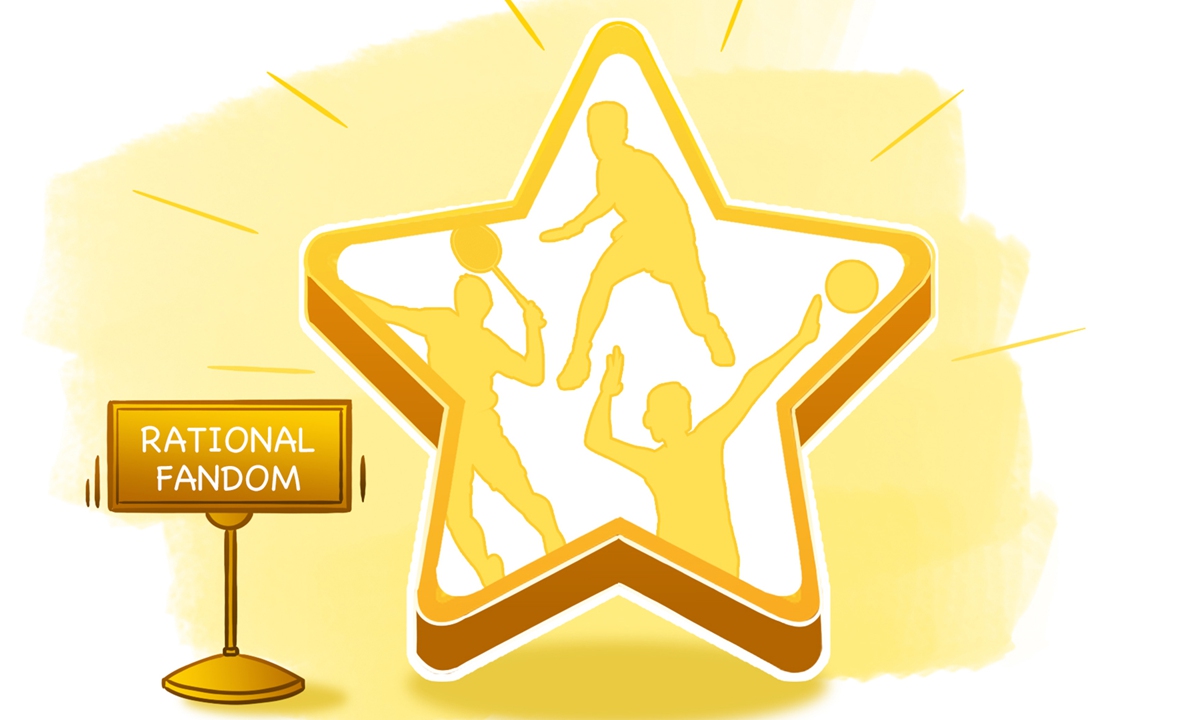
Illustration: Liu Xiangya/GT
With the end of the Olympic Games, the members of Team China are returning to the motherland with medals and praise they gained via hard work. The Paris Olympic champions are being welcomed with unprecedented warmth.
However, fans also need to have a nice sense of propriety and boundaries, and show respect for the privacy of athletes.
Maihe village, China's diving sensation Quan Hongchan's hometown, built a parking lot overnight in Zhenjiang, South China's Guangdong Province, on Monday.
Despite the rainstorm, fans and tourists have been flocking to the village to greet Quan upon her arrival.
In Quan's hometown, Quan's father and grandfather have to receive a large number of tourists every day.
Holding mobile phones as they take pictures, fans walk around the family's gate, even visiting the house multiple times.
In many ways, fan culture has become invasive, disrupting the athletes' personal lives as well as their families' everyday routines.
Although athletes have become public figures with their participation in high-profile events such as the Paris 2024 Olympic Games, fans' frequent en-masse visits have led to invasions of privacy.
Notably, the constant attention could be overwhelming and stressful for athletes, potentially affecting their mental state and ability to perform.
Moreover, Chinese sharpshooter Xie Yu, who won the men's 10m air pistol during the Games, claimed that his mother was abused online.
As of 12 pm on Tuesday, the topic of the status of Xie's family on Sina Weibo had at least 43.99 million views and 48,000 interactions.
Talking about his mother, Xie said that she had recently checked out of the hospital after undergoing treatment for cancer. He urged netizens not to tag his mother on any social media posts.
With the rise of social media, fan culture has amplified the visibility of athletes.
On one hand, social media has offered engagement between fans and star athletes, on the other hand, social media comes with criticism, harassment or trolling.
The phenomenon has further complicated athletes' ability to maintain their private lives. As a result, athletes might find it difficult to live their lives under this social media scrutiny.
Negative fandom behavior, intruding into the athletes or their family members' private life, can deeply impact athletes' mental health.
Athletes, at any stage of their careers, particularly young ones, can experience significant emotional turmoil from harsh criticism or detrimental fan behavior.
Athletes should not be distracted by their relationship with fans. Instead, they need to be laser focused on training and competition.
Perhaps seeing the detriments of such toxic "fan culture," Olympic swimming champion Pan Zhanle disbanded his only fan group on Sina Weibo on Monday, saying that he would rather keep a low profile and stay tranquil.
Many netizens lauded his move, saying this shows Pan's clear head.
Pan not only has achieved remarkable results in swimming at the just concluded Paris Olympics, becoming one of the biggest surprises in swimming, he also is very cool-headed about becoming a national star.
In his own words during an interview, he said "What is not good after becoming famous is there are too many people around... I'd rather not have achieved remarkable results this time, [so that] I'll be able to continue training with peace of mind."
After watching the interesting video clip, netizens understood Pan's intention to stay very focused on sports and reduce external interference. Pan is attempting to protect his personal privacy and ensure his normal life.
It is important to advocate that fans respect athlete's privacy and not go overboard when it come to the amount of attention paid to them.
Pan's gesture indicates his resistance to fan culture. It also mirrors his professional attitude as an athlete.
Fan culture can be a double-edged sword.
In one way, it can foster strong community support for athletes. It is definitely essential to approach the relationship with athletes thoughtfully and respectfully, acknowledging their need for privacy and acceptance as individuals beyond their athletic achievements.
The whole of society needs to treat internet traffic volume and fan culture rationally and maintain a positive and healthy network environment.
In a healthy relationship between athletes and supporters, they are supposed to provide mutual motivation and encouragement.
Athletes win the love of fans with excellent results and tenacious sportsmanship and fans keep a sense of boundaries and respect athletes.
The author is a reporter with the Global Times. life@globaltimes.com.cn




